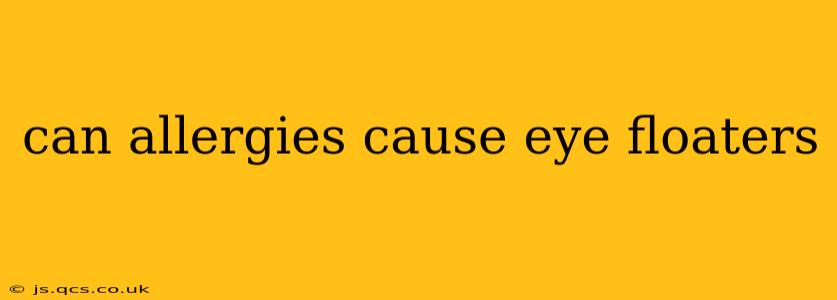Can Allergies Cause Eye Floaters?
Eye floaters, those pesky specks or strands that seem to dance across your vision, are a common experience. While often harmless, they can be unsettling. Many wonder if their allergies might be the culprit. The short answer is: not directly, but allergies can indirectly contribute to conditions that might increase the risk of floaters. Let's explore this further.
What are Eye Floaters?
Before diving into the allergy connection, understanding what eye floaters are is crucial. Floaters are tiny clumps of protein and other cellular debris within the vitreous humor, the gel-like substance filling the back of your eye. As we age, the vitreous humor can shrink and become more liquid, allowing these clumps to become more visible. They appear as shadows cast on the retina, hence the "floating" sensation.
How are Allergies Related to Eye Floaters?
Allergies themselves don't directly cause floaters. However, certain allergy-related conditions can increase your risk of developing them or experiencing a sudden increase in their visibility:
1. Eye Rubbing: One of the most common responses to allergic conjunctivitis (allergic eye inflammation) is intense itching and the urge to rub your eyes. Vigorous rubbing can damage the vitreous humor, potentially dislodging clumps of protein and creating or worsening floaters. This mechanical trauma is a far more likely explanation for a sudden increase in floaters than the allergy itself.
2. Posterior Vitreous Detachment (PVD): While aging is the primary cause of PVD (where the vitreous humor separates from the retina), inflammation from severe allergies could theoretically contribute to this separation. A PVD often leads to a sudden increase in the number of floaters experienced. However, this is not a direct causal link and more research is needed to definitively establish such a correlation.
3. Uveitis: Although rare, allergies can sometimes trigger uveitis, an inflammation of the uvea (the middle layer of the eye). Uveitis can cause floaters, but again, this is an indirect connection, and uveitis itself has many possible causes.
Can Allergies Make Existing Floaters Worse?
While allergies are unlikely to create floaters, they might make existing floaters seem more noticeable. The inflammation and irritation associated with allergies can increase eye strain and fatigue. This can amplify your awareness of floaters, making them feel more bothersome even if their number hasn't changed.
When Should You See an Eye Doctor About Floaters?
While many floaters are harmless, it's crucial to see an ophthalmologist if you experience:
- A sudden increase in the number of floaters
- New floaters accompanied by flashes of light
- A significant "curtain" or shadow across your vision
- Blurred vision
- Vision loss
These symptoms could indicate more serious conditions like a retinal tear or detachment, requiring immediate medical attention.
What are other causes of eye floaters?
Besides aging and allergy-related complications, other potential causes of eye floaters include:
- Eye injuries: Trauma to the eye can cause floaters.
- Eye surgeries: Certain eye surgeries can result in floaters as a side effect.
- Inflammation of the eye: Conditions such as uveitis or other inflammatory eye diseases can also produce floaters.
In summary, while allergies themselves don't directly cause eye floaters, certain allergy-related behaviors (like excessive eye rubbing) and conditions (though rare) can indirectly increase the risk or make existing floaters more prominent. If you're concerned about your floaters, always consult an eye doctor for a proper diagnosis and treatment.
